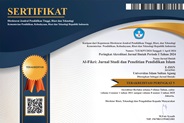GAMBARAN AHMAD DAHLAN DAN WAHAB HASBULLAH DALAM PENDIDIKAN ISLAM TERHADAP NASIONALISME INDONESIA
Abstract
ABSTRACT
This paper will describe a problem concerning Islamic education in Indonesia which is still underestimated. This is very much related to the history of the Indonesian nation which had been colonized for centuries by the Dutch. Therefore, the Islamic community is disadvantaged by the rampant terrorist terrorism, and the severity of this terrorist is associated with Islam, because in practice it always carries Islamic symbols. This has an impact on the assessment of some people who say that Islamic society (santri, kiai, pesantren) do not have a spirit of nationalism. Whereas if we look at history, that Islamic society has a very big contribution to Indonesian independence, we know with the resistance made by Prince Diponegoro which ended with the Diponegoro war, as well as with other resistance carried out by Islamic communities throughout Indonesia. This illustrates how deep the sense of nationalism is owned by the Islamic community. Efforts to counter the notion that the Islamic community does not have a spirit of nationalism is to study the characters, although briefly. With Ahmad Dahlan and Abdul Wahab Khasbullah taken as a presentation of this paper.
Â
Keywords : Influence, Islam, Nationalism.
Full Text:
PDFReferences
DAFTAR PUSTAKA
Amin, Chairul. (1985). Pertumbuhan dan Perkembangan Nahdlatul Ulama. Salatiga : Jatayu.
Anshoriy Ch, HM Nashruddin. (2010). Matahari Pembaharuan : Rekam Jejak KH Ahmad Dahlan. Yogyakarta : Galang Press.
Azra, Azyumardi. (1998). Jaringan Ulama: Timur Tengah dan Kepulauan Nusantara abad XVII dan XVIII. Bandung: Mizan.
. (2003). Surau; Pendidikan Islam: Tradisionalis dalam Transisi dan Modernisasi. Jakarta Logos Wacana Ilmu.
. (2002). Pendidikan Islam; Tradisi dan Modernisasi Menuju Millenium Baru. Jakarta: Logos.
Daya, Burhanudin. (1995). Gerakan Pembaharuan Pemikiran Islam; Kasus Sumatera Thawalib. Yogyakarta: Tiara Wacana.
Dhofier. (1992). Sekolah Al Quran dan Pendidikan Al Quran di Indonesia. Dalam Ulumul Quran Volume III, No.4.
Dhofier, Zamakhsari. (1997). Tradisi Pesantren: Studi tentang Pandangan Hidup Kiai. Jakarta: LP3ES.
Jainuri, Achmad. (2002). Ideologi Kaum Reformis: Melacak Pandangan Keagamaan Muhammadiyah Periode Awal. Surabaya: LPAM.
Karel A, Steenbrink. (1987). Beberapa Aspek tentang Islam Indonesia Abad ke-19. Jakarta: Bulan Bintang.
Maksum. (1999). Madrasah Sejarah dan Perkembangannya. Jakarta: Logos.
Munir Mulkhan, Abdul. (1990). Pemikiran K.H. Ahmad Dahlan dan Muhammadiyah dalm Perspektif Perubahan Sosial. Jakarta: Bumi Aksara.
Putra Daulay, Haidar. (2001). Historisitas dan Eksistensi Pesantren, Sekolah dan Madrasah. Yogyakarta: Tiara Wacana.
Shihab, Alwi. (1998). Membendung Arus; Respon Gerakan Muhammadiyah Terhadap Penetrasi Misi Kristen di Indonesia. Bandung: Mizan.
Supiana. (2012). Metodologi Studi Islam. Jakarta : Direktorat Jenderal Pendidikan Islam, Kementrian Agama RI.
Suprapto, H. M. Bibit. (2010). Ensiklopedi Ulama Nusantara. Jakarta : Gelegar Media Indonesia.
Syafii maarif, Ahmad. (1985). Islam dan Masalah Kenegaraan: Studi tentang Percaturan dalam Konstituante. Jakarta:LP3ES.
Zuharini, dkk. (2008). Sejarah Pendidikan Islam. Jakarta: Bumi Aksara.
Zuhri, Saifudin. (1983). Kiai Wahab Khasbullah Bapak dan Pendiri NU. Yogyakarta: Pustaka Falakiyah.
DOI: https://dx.doi.org/10.30659/jspi.v2i1.4013
Refbacks
- There are currently no refbacks.
Al-Fikri is published by the Department of Islamic Religious Education, Faculty of Islamic Studies, Universitas Islam Sultan Agung, Semarang, Indonesia.

This work is licensed under a Creative Commons Attribution 4.0 International License








